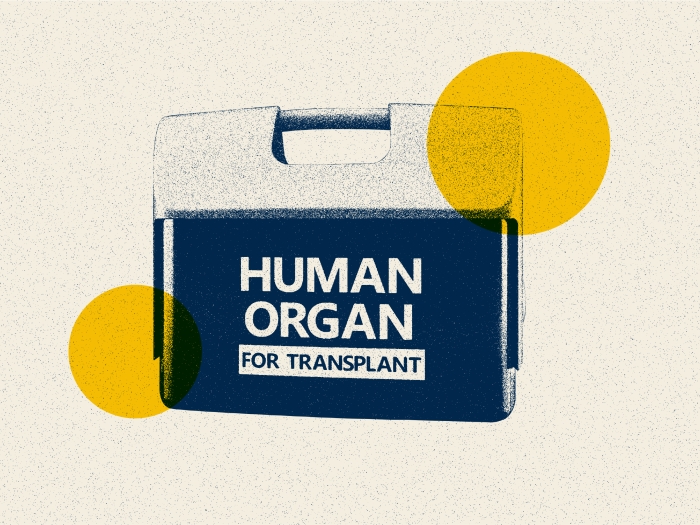From length of time with a breathing tube to the number of blood transfusions, investigators identify 9 risk factors
5:00 AM
Author |

Undergoing a heart procedure comes with risks, one of them being pneumonia — the most common infection following cardiac surgery.
“Pneumonia and infection in general are a major concern after any surgical procedure, and cardiac surgery patients undergo a complex operation placing patients at risk,” said Francis Pagani, M.D., Ph.D., cardiac surgeon at the University of Michigan Health Frankel Cardiovascular Center and associate director of the Michigan Society of Thoracic and Cardiovascular Surgeons Quality Collaborative.
Investigators set out to determine if they could enhance the quality of care provided to cardiac surgical patients by identifying factors that were associated with a higher risk of developing pneumonia.
Led by Donald Likosky, Ph.D., the team analyzed a group of over 70,000 patients who underwent cardiac surgery across 33 institutions between 2011 and 2021.
Their work was supported in part by Blue Cross Blue Shield of Michigan and the Agency for Healthcare Research and Quality.
The researchers uncovered nine elements that have significant effects on a whether a patient may develop pneumonia, with nearly 20% of patients moving into a higher risk category based on what occurred during or following the surgery.
The results are published in The Journal of Thoracic and Cardiovascular Surgery.
“We sought to evaluate what sets of practices occurring in the intraoperative and postoperative period increased or decreased a patient’s risk of developing pneumonia,” Likosky said.
The first of nine factors associated with a higher risk of pneumonia after cardiac surgery is spending a longer time with a breathing tube immediately following the surgery.
“The longer the breathing tube remains in your throat, the more chance there is of developing an infection, and so extubating, or removing the breathing tube, later than six hours following the operation was associated with a higher risk of pneumonia,” said first author Noah Barnett, a third-year student at the University of Michigan Medical School.
Another factor identified by the investigative team is the use of an intra-aortic balloon pump, a machine inserted in the artery of a patient’s leg that is used to support weak hearts.
“If a patient were at risk of going into shock and dying, providers can place a pump in the aorta, one of the large blood vessels of the body, to help boost their blood pressure, a lifesaving procedure,” Barnett said.
Other factors associated with an increased chance of pneumonia include a patient being on cardiopulmonary bypass for more than 90 minutes and having intraoperative blood transfusions.
Undergoing a surgical aortic valve replacement operation, relative to coronary artery bypass grafting, was also associated with a reduced risk of pneumonia.
Additionally, Barnett explains, having a transesophageal echocardiogram, which is standard procedure during the operation, was also associated with a higher risk.
“Providers need to perform the echocardiogram by placing it through the esophagus, which allows them to have a better view of the heart’s function,” he said.
Body temperature during surgery can also play a role.
“During cardiac surgery, a patient’s blood is often diverted to a device called the heart-lung machine, which temporarily serves the role of the patient’s lung. Instead of the blood going into the heart, it goes into the machine, which oxygenates the blood,” Barnett said.
“At the same time, prior work has documented a protective effect on brain injury and end organs associated with cooling, given that lower temperatures reduce a patient’s metabolic demand. The present study found that lower blood temperatures were associated with a reduction in pneumonia.”
The final factor is revascularization.
“Patients often present for cardiac surgery because of decreased blood flow in their coronary arteries that feed the muscles of their heart,” Barnett said.
“During an operation, the surgeon bypasses the area with restricted blood flow. By doing so, the surgeon is able to return blood flow and oxygen to the areas of the heart that were previously inadequately supported.”
“Our data suggests that bypassing a greater percentage of diseased coronary vessels is associated with less risk of postoperative pneumonia.”
Patients can help themselves avoid postoperative pneumonia by listening to their medical team and completing the breathing exercises given to them, Pagani says.
“It’s the responsibility of the health care team to educate patients about what patients can do to reduce the risk,” he said.
“It’s very important to be active in taking respiratory exercises to increase their lung capacity.
Then, afterwards, cooperating with the healthcare team and trying to walk and using your incentive spirometer (a handheld medical device that trains the lungs to take slow, deep breaths following surgery) can also reduce your risk of pneumonia.”
Additional authors include Xiaoting Wu, Ph.D., Min Zhang, Ph.D., Carol Ling, M.S., all of University of Michigan, Daniel R. Liesman, M.D., of Northwestern University, Raymond J. Strobel, M.D., M.Sc., of University of Virginia, Gaetano Paone, of Emory Health, Alphonse DeLucia III, M.D., of Bronson Medical Center, and the Michigan Society of Thoracic and Cardiovascular Surgeons Quality Collaborative.
Paper cited: “The association of intraoperative and early postoperative events with risk of pneumonia following cardiac surgery,” The Journal of Thoracic and Cardiovascular Surgery. DOI: 10.1016/j.jtcvs.2023.09.056
Sign up for Health Lab newsletters today. Get medical tips from top experts and learn about new scientific discoveries every week by subscribing to Health Lab’s two newsletters, Health & Wellness and Research & Innovation.
Sign up for the Health Lab Podcast: Add us on Spotify, Apple Podcasts or wherever you get you listen to your favorite shows.

Explore a variety of health care news & stories by visiting the Health Lab home page for more articles.

Department of Communication at Michigan Medicine
Want top health & research news weekly? Sign up for Health Lab’s newsletters today!





